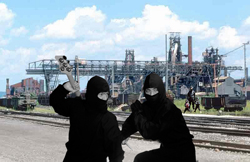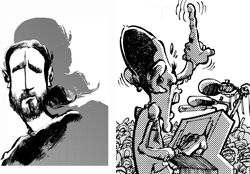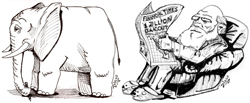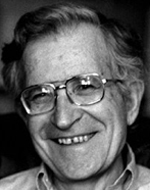| |||||||||||||||||||||||||||||||
| DOMESTIC POLITICS | RELATED ARTICLES | ||||||||||||||||||||||||||||||
Part 1 in a 10-part series Lincoln Heights, Michigan - This decaying suburb of Detroit was once a thriving bedroom community for the families of workers at nearby steel mills and automobile plants. But as the steel industry shifted overseas and auto plants shut down, Lincoln Park slid into poverty, and today is best known for a 1999 resolution by the school board banning "gang-related" colors and insignia. Those that could moved away to better neighborhoods. Those that couldn't - many of them impoverished ninja - had to remain behind. Makoto Kiyohara was born to a clan of ninja here in Lincoln Heights in 1962. In those days, his future looked bright. Although his people had been oppressed in the past, the Ninja Civil Rights Movement was in full swing, and President Kennedy had just spoken to a meeting of the National Association for the Advancement of Ninjas, calling for "a bold new America, in which every ninja has access to a good job, every ninja family can afford its own home, and every ninja child can receive a good education." Indeed, things seemed to finally be turning for the better as Kiyohara was growing up a young ninja in the 1960s and 1970s. His father Mutsu rose to become a regional manager of the local steel conglomerate, and his older brother Aki even got into Veterinary School (ninja were still not allowed to go to Medical School in those days). When Makoto graduated from high school he got a job at the General Motors plant, and began to rise through the ranks. But then came the "Ninja Backlash" of the 1980s, when a series of racist books and films played upon the worst ninja stereotypes to revive Americans' irrational fears of the ninja. Although ninja were nominally equal in the eyes of the law under the Ninja Rights Act of 1965, doors that had briefly opened for the ninja once again began to be slammed in their faces. As other minorities forged ahead, the ninja were left behind, denied access to higher education, systematically discriminated against in the job market, and overlooked on the national political scene.
"In many ways we have only ourselves to blame," says Kiyohara. "Ninja are very good at throwing shuriken with stunning accuracy, using nun-chucks for tasks ranging from baseball to electrical engineering, and of course, blending into the shadows. But sometimes that hurts us when otherwise sympathetic Americans begin to forget we are here." In 2002, Kiyohara lost his job at the plant, following several pay cuts, in cutbacks GM officials called "purely fiscal in nature" but which many observers described a thinly veiled purge of its last remaining ninja employees. For the past five years Kiyohara has struggled to make ends meet by working at the local Walmart and bussing tables at the Outback Steakhouse. The worst part, he says, is when he thinks of what the future may hold for his two young sons, Hiromu and Junnosuke. "What will their lives be like?" he wonders. "At least I've had my taste of the good life, but will they even be able to find jobs at all? Will they be able to marry the lady ninja of their choice?" Indeed, the question of ninja marriage remains a hot-button issue among ninja rights activists and their opponents. Although the Ninja Dilution Act - a 1924 statute banning marriage between ninja in an effort to break up the once mighty ninja clans and prevent them from passing on their deadly ninja secrets - remains on the books today, in recent decades it was rarely if ever enforced, and indeed Kiyohara encountered no trouble when he married his wife Kyoko, a fellow ninja, in 1985. But after a Minnesota judge ordered the legalization of ninja marriage in 2004, fears of ninja rising up to institute a new reign of terror via assassinations and sabotage such as those of the 1880s have led 43 states to pass laws or even amend their constitutions to reaffirm the federal ban on ninja marriage. But Kiyohara says he is still proud to be an American, and is still hopeful that change will come. "You look around, and you see an America that is more open-minded than ever. Many minorities are making great strides, and our day will come."
But that day is not here yet, and Kiyohara wonders why. "I was glad when I heard about [radio personality Don] Imus getting fired, but where was the uproar when Imus called the predominantly ninja Vanderbilt lacrosse team a bunch of 'sword wielding wack-jobs'? It's also quite unsettling how many Americans - ninja included - casually use the "N-word", as if it didn't represent a historical legacy of oppression. And recently there was a day to honor Jackie Robinson, but where is the day to honor the first ninja baseball player Tatsuya Sato, who played for the St. Louis Browns in 1952 and could run to first base without being seen?" Kiyohara takes heart in a new generation of ninja activists who are carrying on the fight, usually in groups of fifteen to twenty. He also finds hope in the more positive portrayal ninja characters on recent television shows such as "Grey's Anatomy" and "Desperate Housewives." But most of all, he is inspired by the recent discovery that presidential hopeful Barak Obama has ninja ancestry. If Obama were to win, he would become the first ninja president in American history. "He may not look or talk like a ninja, but you can see the ninja spirit in the way he carries himself," Kiyohara points out. "If he gets nominated, Obama is definitely going to get the ninja vote in 2008! We're not the biggest demographic, but after struggling so long with disenfranchisement, the ninja community knows how important it is to make every vote count." HSP
|
SPONSORED LINKS
SPONSORED LINKS
SPONSORED LINKS | ||||||||||||||||||||||||||||||
| |||||||||||||||||||||||||||||||
| The Harvard Satyrical Press is not intended for readers under 18 years of age (Disclaimer) | (c) Copyright 2026, The Harvard Satyrical Press, Some Rights Reserved | ||||||||||||||||||||||||||||||






 FACEBOOK
FACEBOOK REDDIT
REDDIT STUMBLEUPON
STUMBLEUPON DEL.ICIO.US
DEL.ICIO.US











